In June 2018, Italian photographer Nicol Lanfranchi joined the last ship patrolling the Mediterranean to save refugees. Then, over many months, he tracked them down to their new homes
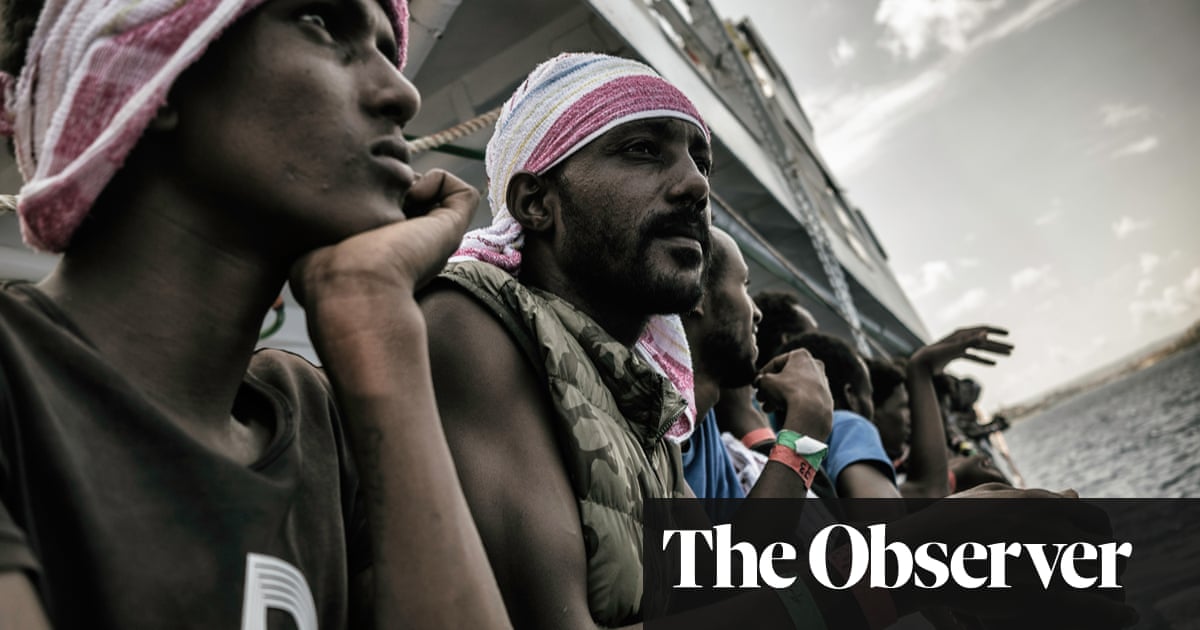
In early 2018 Italian-born photographer Nicol Lanfranchi was living in Berlin combining reportage work with commercial projects. He travelled the world for German media, producing stark images of the slow death of Brazilian rivers and the dignity of survivors of the Haiti earthquake.
But he began watching with growing horror as a crisis unfolded closer to home. In his native Italy he could see an increasingly rightwing government cracking down on the rescue ships that patrolled the Mediterranean, particularly off the coast of Libya, threatening fines of tens of thousands of euros for bringing ashore people who were risking their lives trying to reach Europe in flimsy boats. By June, when the countrys hardline interior minister Matteo Salvini began closing Italys ports to the rescue ships, 45,000 migrants had already crossed the Mediterranean that year, with more than 1,000 deaths. Salvinis crackdown worked. Ships began to vanish, until there was only one left: the Aquarius, run by Mdecins Sans Frontires (MSF) and SOS Mditerrane.
I was following this debacle from abroad, says Lanfranchi. It was really painful to see how these rescue crews were being criminalised by my own government.
Lanfranchi wanted to know more about the endemic brutality and violence in Libya that was making people take to the sea in desperation as their only way out.
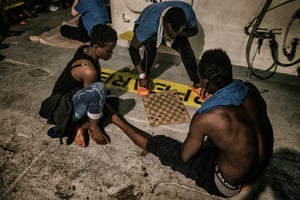
-
Jolle and her husband Narcisse, both from Ivory Coast, playing chequers on Aquarius. Jolle says: I left Ivory Coast to work and ended up in Libya. On our first attempt to cross the sea we were caught and put in prison. The conditions were not human, people died every day. While my husband was searching for me a man sold me into prostitution.
I thought that my work as a storyteller could play a part in telling people the truth about what was happening. I was in contact with MSF trying to find out how many people were dying at sea. Then one day they called me and said: Next week we are leaving Marseille. Do you want to be with us?
Lanfranchi agreed and a week later found himself on board Aquarius as the ship rescued two boatloads of people. Some were refugees who had arrived in north Africa after escaping war in Eritrea, others were economic migrants from places such as Ivory Coast, fleeing the Libyan violence.
Once everyone was on board and given water, there was a palpable sense of release, Lanfranchi says. I looked for people as they sat quietly, I asked if I could talk to them. There was one man who stood out to me, Augustine people were drawn to him like a magnet.
He told me, Today, August 10th, is my birthday, Lanfranchi continues. As soon as he walked away from me people started singing, playing music, dancing. You can see in the photos, they were also celebrating their joy at being rescued. For them it was the first step to a better life.
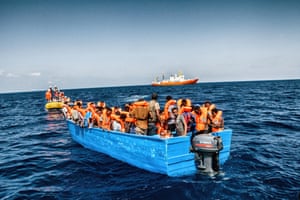
-
Rescue on the Med. Lanfranchi says: The Aquarius rescued two boats while I was on board.The first had around 25 people, most of them from West Africa. The second was bigger, around 120 people, including many unaccompanied minors from Eritrea. The motor of the boat had stopped working, it was really crowded.I remember the eye contact with them. They were exhausted. It was the hottest hour of the day. The sun was direct on their heads and there was such a silence.
But over the next five days the Aquarius drifted, refused entry by governments and local authorities across the southern Mediterranean. Finally on 15 August the boat was given instructions to proceed to the Maltese port of Valletta where the migrants were taken on a police bus to detention. It was from Malta that arrangements were made through United Nations High Commissioner for Refugees (UNHCR) and European governments to send small groups to villages and towns around Europe. Places were offered after local campaigns asking mayors and councils to show solidarity with the migrants
Lanfranchi was now desperate to know how he could follow the stories of those he had met, friends he had made. None of them had phones but I found people on Facebook. It took months. Slowly we created a network, I asked where are you now? And I was told, Im in France, my friend is in Luxembourg. I was determined to find out what happened next.
What happens next for refugees who make it across the Mediterranean alive is a burning question throughout Europe. Italy and Malta want asylum seekers to be automatically relocated across Europe so that the burden is shared.
The EU promises that asylum must not be a lottery, stating that member states must welcome asylum seekers in a dignified manner, ensuring that . no matter where an applicant applies, the outcome will be similar.
Lanfranchi was intent on discovering if the system was fair. If everyone he met would get the same treatment, wherever they ended up. And so he set off across Europe to find out.
Vesoul, France
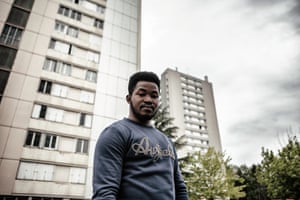
-
Augustine in France. The Nigerian, 23, says: We had been three days at sea before the Aquarius found us. We had waved at so many boats. Then we saw it far away. That was the beginning of hope. When I got on board I knew life would never be the same again. My only sadness is that now I have protection in France I am not allowed to travel home. I miss my family, I hunger for Nigeria.
I decided to start with Vesoul, says Lanfranchi. This is where Augustine was living and he is such a bright, connected guy. He was resettled with Mercy, his girlfriend. They were living in the same building as another couple from the boat, Jolle and her husband Narcisse. Both women are pregnant.
Vesoul, 350km south-west of Paris, is a neat and quiet town where the arrivals were placed on a housing estate at the edge of town overlooking the fields.
Augustine and his friends are delighted with where they have ended up. Their apartments are spotless, they have been offered French lessons and they have social workers to help them assimilate.
Augustine is keen to give as much to his new home, France, as possible. Much was expected of me at home as the oldest son, but the situation was not secure in Nigeria. I studied science at school but here I want to be realistic about what kind of job I can do. I need to improve my French and find work.
Jolle is transformed. She had escaped months of brutal violence in Libya and can be seen on the boat with cropped hair and a haunted expression. Now she has long curling hair and a healthy baby bump. She smiles as she recalls the Aquarius appearing on the horizon.
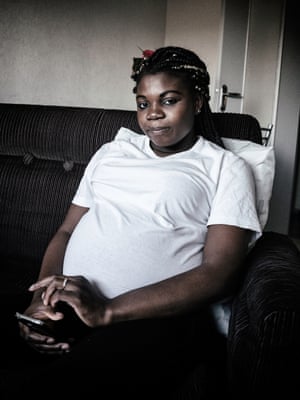
-
Mercy Iboyi, 26, from Nigeria, in Vesoul, France. Since the photo was taken, Mercy and her partner, Augustine, have had a baby boy, Emile. Mercy says: I am really happy because God almighty has done it again for me. I had a safe delivery, my son is doing great, we are just starting life here in France. By Gods grace everything will be OK.
It was God who sent that boat. We had given up waving at boats but the Aquarius came for us and we are always thankful to God for that. Coming to France wasnt a choice but Im very happy here.
Lanfranchi was surprised to find his friends living in such a calm and welcoming environment. They are really grateful. Yes there are migrants from many countries on this estate but there are also French people. I called it the peaceful ghetto. They are working and getting support.
The local town has opened itself up to the group who arrived here. They have work training, support from social workers in looking for jobs, French lessons. Most of them now have five years leave to remain.
Augustine hopes to become a nurse. He laughs often now. He originally left west Africa for economic reasons, but like Joelle he was seriously abused in Libya.
Lanfranchi is relieved for them. Augustine was tortured in Libya, he was electrocuted. Now I can see him calming down, becoming a human being again. I was also so happy to see Joelle. I dont know if she has enough psychological support for what she went through but I think being pregnant together with Mercy, as friends, will be good for them.
Bielefeld, Germany
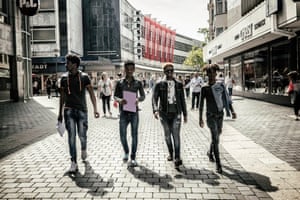
-
From left: Aman, Amanuel and Aminadab with a friend from Eritrea, walking in Bielefeld, Germany. Aminadab says: I left Eritrea because of my religious beliefs. In school I refused to take off my cross. I was imprisoned for six months. I want to stay here, get a job and live in peace. In Germany no one bothers us about religion.
After Vesoul, Lanfranchi visited Bielefeld in north-western Germany where the unaccompanied minors from the boat were sent. The boys, aged between 16 and 18, had suffered some of the hardest journeys, walking together from Eritrea, overland through Sudan to Libya, going days without water and food.
The offer from the mayor of Bielefeld to resettle the boys from Malta came because of pressure from residents, who wanted to offer a new life to unaccompanied minors.
The home is set up with shared rooms and a large kitchen they can use themselves. Above the iron-framed camp beds the boys have hung religious pictures. They like to spend time in the town skate park.
The young people, who spent many months surviving without adults on their journey, find the rules of the centre difficult. Amanuel Yemane, 18, from Eritrea says: I like Germany but we have no privacy so I cant play my krar [Eritrean guitar].
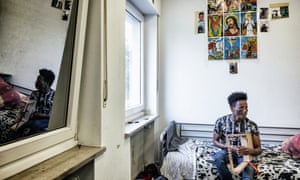
-
Amanuel Yemane, 18, from Eritrea, playing the krar in his room in home for unaccompanied minors in Bielefeld.
But he is determined to make the most of his new life. I am transformed, I am a new person. I want to learn German and become an electrician. If it was not for the Aquarius I would be food for the fishes. I think all the time of my friends who are still suffering in Libya and Eritrea.
But Lanfranchi fears that the teenagers natural impatience with rules will lead to problems for them.
He is most worried about one boy, Aminadab. He has a girlfriend, he has drinks with a friend and maybe he stays out with friends or this girl. These things are very normal but they call the police on him.
I took him aside at the end of my visit, and said I want to speak with you as a friend. I said: I am worried about you. You are very lucky, many people dont survive. Dont become what some people want to see, the immigrant guy doing bullshit. If you continue like this they will send you back to Eritrea and then you wasted the best years of your life for nothing.
Diekirch, Luxembourg
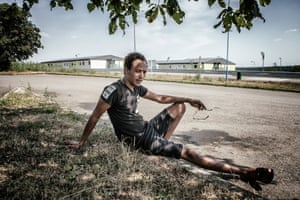
-
Benyam Yohanes, 25, from Eritrea, in front of the reception centre in Diekirch, Luxembourg.Lanfranchi says: I didnt remember these guys from the boat, but the boys in Germany told me I should visit them. They told me they were sad and frustrated. They sent me pictures of the centre and said, Its really bad here, come and look at how we are living.
The final trip Lanfranchi took was to Luxembourg. These werent guys that I remembered from the boat, he says. I was put in touch with them by the boys in Germany. They are young adults, about 18 to 25.
I was chatting with them online and they sent me pictures of the containers they are living in. They call it a detention centre, even though they can go out. They say, We are in a free prison. Its very far from the town, on a small mountain, 40 minutes walk to a shop. They sign a paper every time they leave. They must be back at 10 oclock, or immediately the centre will inform the police. There are so many guards, there are cameras all around.
The town is diverse but they cant work without papers and even when they get them its a very long process to get a decent job. And its expensive to find a place to live.
Lanfranchi sees some hope across Europe. I think there has been a resistance to the right. European leaders are talking about how to resolve and respond better to the migrant crisis and it is now easier to work at sea.
But he also sees more than ever the brutal role of luck. Its like a slot machine you try and if you are lucky you win. Augustine was the luckiest guy of all to me. He survived torture, he got on the small wooden boat, was rescued. He found his girlfriend on the rescue boat now they are living with their friends, they have money, they are safe, they have a home. Yet the men in Luxembourg have had a different experience. There is no justice.


Recent Comments